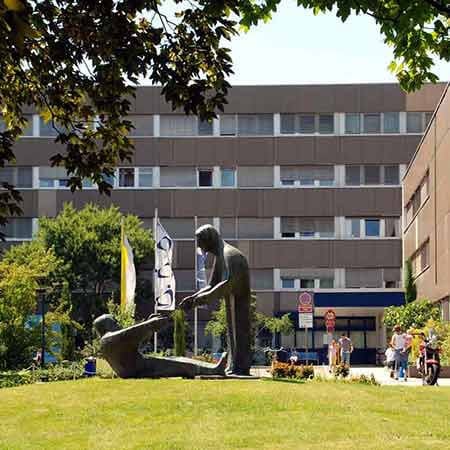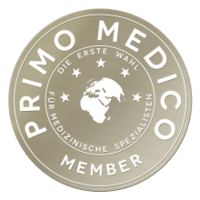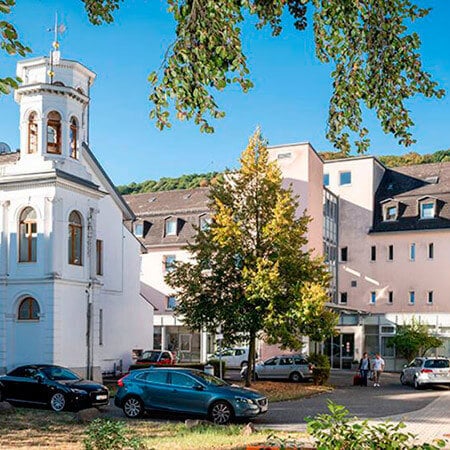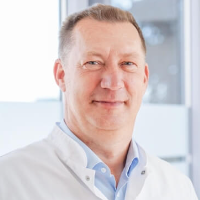Lung Cancer — Chemotherapy: treatment in the Best Hospitals of Germany
Treatment prices are regulated by national law of the corresponding countries, but can also include additional hospital coefficients. In order to receive the individual cost calculation, please send us the request and medical records.

Department of Oncology
The Department of Oncology offers high-precision diagnostics and comprehensive treatment of oncological diseases, including palliative care for patients with terminal stages of malignancies. The specialized Cancer Center Berlin-Buch also operates on the basis of the department, which allows treating patients in interdisciplinary cooperation with the involvement of various specialists. The doctors of the department have rich experience in treating patients with oncopathologies, and also have a perfect command of all the modern and most effective therapeutic methods. The department is certified in accordance with the standards of the German Cancer Society.



Department of Hematology and Oncology
The Department of Hematology and Oncology treats solid malignant tumors of various localizations, blood cancer, and benign hematopoietic pathologies. A qualified team consisting of oncologists, hematologists, psycho-oncologists, physiotherapists, and experienced nursing staff takes care of the health of patients. Whenever required, doctors from related medical fields are also involved in the therapeutic process. All specialists make every effort to provide patients with effective and personalized medical services while surrounding them with care. The department is part of the Cancer Center of the hospital, which is certified according to the requirements of the German Cancer Society (DKG). The department prefers a multidisciplinary approach, holding weekly tumor boards with the participation of oncologists, hematologists, radiation therapists, and surgeons, as well as highly specialized experts in gynecology, urology, gastroenterology, pulmonology, etc. The department's specialists have in their arsenal modern treatment methods for malignant diseases, including chemotherapy, targeted therapy, immunotherapy, hormone therapy, and many others. Patients with advanced stages of cancer are offered palliative care aimed at alleviating pain syndrome and ensuring a decent quality of life.




Department of Oncology and Palliative Care
The Department of Oncology and Palliative Care provides palliative treatment for patients with incurable diseases. The goal of the department's physicians is to alleviate the symptoms of the disease and improve the quality of life. The department's specialists take an individual approach to each patient, always respecting the patient's wishes. A competent multidisciplinary team, consisting of palliative care specialists, nurses, psycho-oncologists, physiotherapists and social workers, works here for the benefit of the patients.




Chemotherapy is the main treatment method of lung cancer in most patients. This disease is usually detected at the advanced stages, when it is no longer possible to remove the tumor surgically. If the operation is performed, chemotherapy is usually prescribed after the operation for the destruction of the remaining cancer cells and prevention of a relapse.
In what cases can chemotherapy be applied?
Cytotoxic drugs can be used at all stages of cancer. The main types of chemotherapy are:
- Adjuvant chemotherapy is used after surgery to reduce the risk of tumor recurrence
- Neoadjuvant chemotherapy is used before surgery to reduce the size of the neoplasm and to make lung cancer resectable
When treating small-cell lung cancer, the surgical method is usually used only at the first stage. Chemotherapy is performed to prevent a relapse after surgery. Starting from the second stage, this treatment method becomes the main one. It helps to restrain tumor growth for some time.
When treating small-cell cancer, the surgery can be performed at the stages 0, 1, 2. Some patients can also be operated at stage 3 lung cancer. After the removal of the neoplasm at the stage 0, chemotherapy is usually not required. After the removal of tumor at the stage 1, chemotherapy is sometimes prescribed for the patient, but only in the cases when the risk of a relapse is rated as high. Starting from the second stage, chemotherapy is always prescribed for the patient upon the surgical treatment completion.
After the removal of a malignant tumor, cancer cells can sometimes be detected at the edges of the removed tissue. In this case, either a second operation or a course of chemotherapy with irradiation is required to reduce the likelihood of a relapse.
When chemotherapy cannot be applied?
Chemotherapy cannot be used in the following cases:
- After the removal of non-small-cell tumor with a small size (stage 0 or 1)
- In poor somatic health, when chemotherapy can lead to dangerous complications
- In patients who do not tolerate chemotherapy (in this case, radiation therapy can be prescribed instead of it)
For most patients with lung cancer, chemotherapy remains the main treatment method, because malignant tumors are usually detected at the advanced stages, after the onset of symptoms. The doctors perform surgery in only 10-15% of patients with lung cancer. Other patients are treated by means of conservative methods.
How is chemotherapy carried out?
In most cases, chemotherapy is administered to the patient intravenously. It can be intravenous injections or infusions (droppers). Sometimes a central venous catheter is inserted, through which drugs are administered to the patient.
Chemotherapy is carried out cyclically. One cycle is about 1 month. In total, the patient requires from 3 to 6 such cycles. The duration of therapy depends on the following aspects:
- Stage of lung cancer
- Effect of treatment
- Number of side effects
More cycles of chemotherapy are required for patients with metastatic lung cancer. These patients can additionally undergo targeted therapy, immunotherapy and irradiation.
Supportive chemotherapy is prescribed for some patients. It is indicated only to those who respond well to the treatment and achieve remission due to chemotherapy.
Sometimes a person stops responding to treatment. The tumor does not decrease in size or continues to increase even with chemotherapy. In this case, the regimen is changed, drugs of another pharmacological group are prescribed. Other treatment options are immunotherapy or targeted therapy.
Side effects
Chemotherapy always causes side effects. The treatment is especially badly tolerated by elderly and weakened patients. Poor health can be a reason for chemotherapy limitation, but the age itself cannot be a contraindication. Even elderly people can undergo chemotherapy, if they are healthy enough for it.
The following side effects of chemotherapy occur after using most drugs:
- Hair loss
- Nausea
- Vomiting
- Functional bowel disorders
- Weight loss
Some drugs damage peripheral nerves. Clinically, this is manifested by tingling, burning in the limbs, feeling of heat or cold, muscle weakness. These phenomena usually disappear some time after drug withdrawal, but in some patients they persist for a long time.
Chemotherapy, especially prolonged one, always inhibits the hematopoietic function of the red bone marrow. The level of red blood cells in the blood decreases in patients, which is clinically manifested by weakness, shortness of breath, skin paleness and rapid pulse. In the case of decrease in platelet count, blood clotting becomes impaired bruises occur on the body and gums bleed. Due to the insufficient production of leukocytes, the immunity deteriorates and the risk of infectious diseases increases.
Treatment in Germany with the Booking Health company
You can undergo a course of chemotherapy treatment in Germany by booking the program via the Booking Health service at an affordable price. We provide the following benefits:
- Selection of the best clinic for the treatment of lung cancer, which specializes in this disease and achieves better results.
- Reduced costs for medical services up to 50% due to the lack of overpricing and additional coefficients for foreign patients.
- Booking an appointment on the most suitable dates for you.
- Preparation of the program, taking into account previously performed examinations.
- Establishment of communication directly with the attending physician.
- Monitoring of the program at all its stages.
- Control of invoices, return of unspent funds.
- Buying and forwarding medicines.
- Organization of additional diagnostic or therapeutic procedures.
- Communication with the clinic upon treatment completion.
The Booking Health company will provide top-class services. Our employees will book a room for you at the nearest hotel to the Cancer Center, help you to prepare the documents and book airline tickets, arrange a transfer from the airport to the hotel or clinic, and then provide a return transfer upon the program completion.

